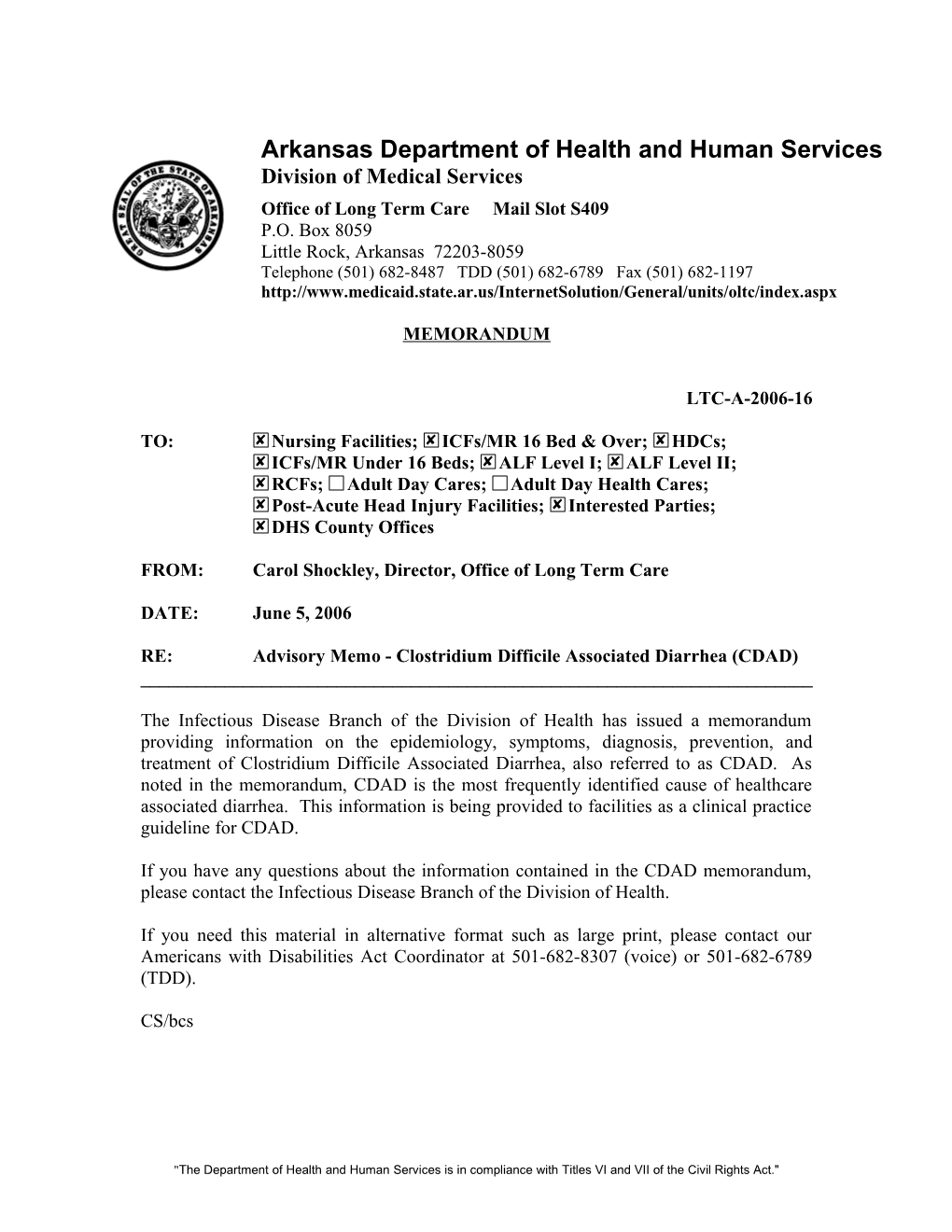Division of Medical Services
Office of Long Term Care Mail Slot S409
P.O. Box 8059
Little Rock, Arkansas 72203-8059
Telephone (501) 682-8487 TDD (501) 682-6789 Fax (501) 682-1197
MEMORANDUM
LTC-A-2006-16
TO: Nursing Facilities; ICFs/MR 16 Bed & Over; HDCs;
ICFs/MR Under 16 Beds; ALF Level I; ALF Level II;
RCFs; Adult Day Cares; Adult Day Health Cares;
Post-Acute Head Injury Facilities; Interested Parties;
DHSCounty Offices
FROM:Carol Shockley, Director, Office of Long Term Care
DATE:June 5, 2006
RE:Advisory Memo - Clostridium Difficile Associated Diarrhea (CDAD)
______
The Infectious Disease Branch of the Division of Health has issued a memorandum providing information on the epidemiology, symptoms, diagnosis, prevention, and treatment of Clostridium Difficile Associated Diarrhea, also referred to as CDAD. As noted in the memorandum, CDAD is the most frequently identified cause of healthcare associated diarrhea. This information is being provided to facilities as a clinical practice guideline for CDAD.
If you have any questions about the information contained in the CDAD memorandum, please contact the Infectious Disease Branch of the Division of Health.
If you need this material in alternative format such as large print, please contact our Americans with Disabilities Act Coordinator at 501-682-8307 (voice) or 501-682-6789 (TDD).
CS/bcs
1
/Arkansas Department
/of Health and Human Services
Division of HealthPaul K. Halverson, DrPH, Director
Infectious Disease BranchP.O. Box 1437, Slot H-41 / Little Rock, AR 72203-1437 /
- 501-661-2000
- TDD: 1-800-234-4399
1
Date:5-31-06
Clostridium difficile associated diarrhea (CDAD)
EPIDEMIOLOGY: C. difficile is the most frequently identified cause of healthcare associated diarrhea. It is a spore-forming, gram-positive bacillus that produces two exotoxins: toxin A and toxin B. The majority of C. difficile infections are acquired in healthcare facilities, and most patients remain asymptomatic following acquisition. Antimicrobial exposure is the greatest risk factor for acquisition. Other risk factors include gastrointestinal surgery/manipulation, long length of stay in healthcare settings, serious underlying disease, immunocompromising conditions, and advanced age.
SYMPTOMS: Clinical symptoms include watery diarrhea, fever, loss of appetite, nausea, and abdominal pain/tenderness.
DIAGNOSIS: Enzyme immunoassay detection for toxins A and B or antigen detection for C. difficile. Testing of asymptomatic patients, including those who are asymptomatic after treatment, is not recommended.
PREVENTION:
Use antibiotics judiciously
Contact precautions for patients with symptomatic CDAD
- Place patients in private room. If private room is not available, these patients can be placed in rooms (cohorted) with other patients with CDAD.
- Hand hygiene. Use soap and water as alcohol-based hand rubs may not be as effective against spore-forming bacteria.
- Use gloves when entering patients’ rooms and during patient care. Wash hands after removing gloves.
- Use gown if having contact with the patient or patients’ environment.
- Dedicate patient care equipment to only the CDAD patient.
- CONTINUE THESE PRECAUTIONS UNTIL DIARRHEA CEASES. NO DIARRHEA, NO PRECAUTIONS.
Ensure adequate cleaning and disinfection of environmental surfaces and reusable devices, especially items likely to be contaminated with feces and surfaces that are touched frequently.
TREATMENT:
If possible discontinue antimicrobials - CDAD will resolve in 23% of patients within 2-3 days of discontinuing antimicrobials. Metronidazole (Flagyl) 250mg PO four times daily or 500 mg PO three times daily for at least 10 days. Relapses may be retreated with a second course of metronidazole (Flagyl) or oral Vancomycin 125 mg four times daily. Cholestyramine 4 gm oral TID x 10-14 days may be added to either regimen. Antiperistaltic agents should not be administered, either alone or in conjunction with specific therapy. These agents may predispose patients to toxic megacolon.
REFERENCES:
Gerding, DN, et al. SHEA Position Paper Clostridium Difficile-Associated Diarrhea and Colitis, ICHE 1995; 459-77
Simor, AE, et al. SHEA Position Paper clostridium difficile in Long-Term-Care Facilities for the Elderly , ICHE 2002; 690:703
1
